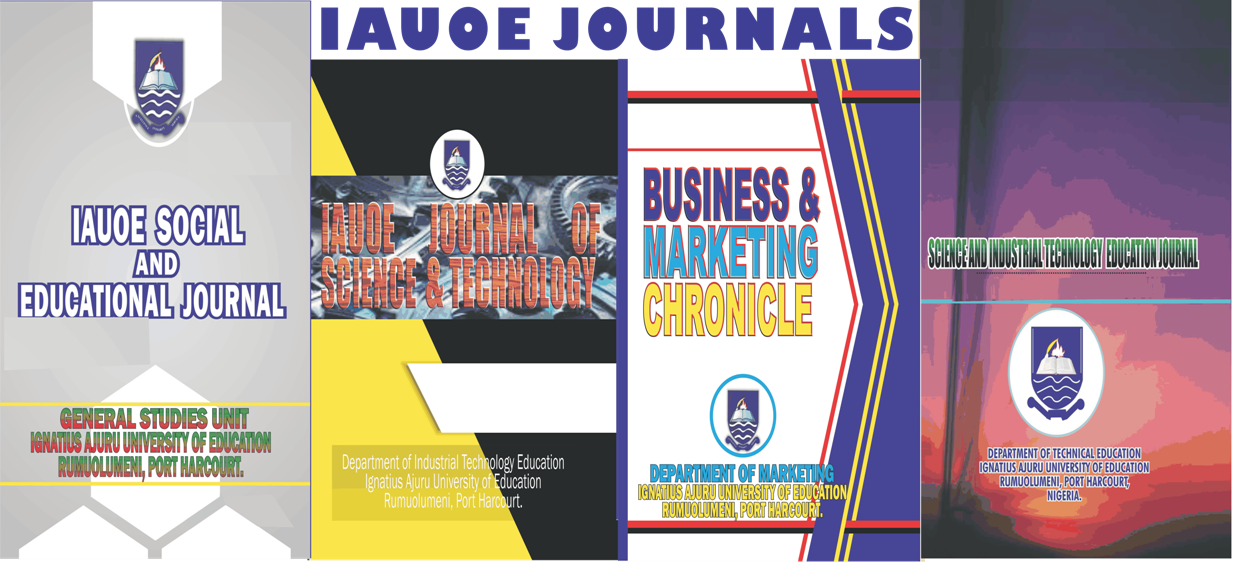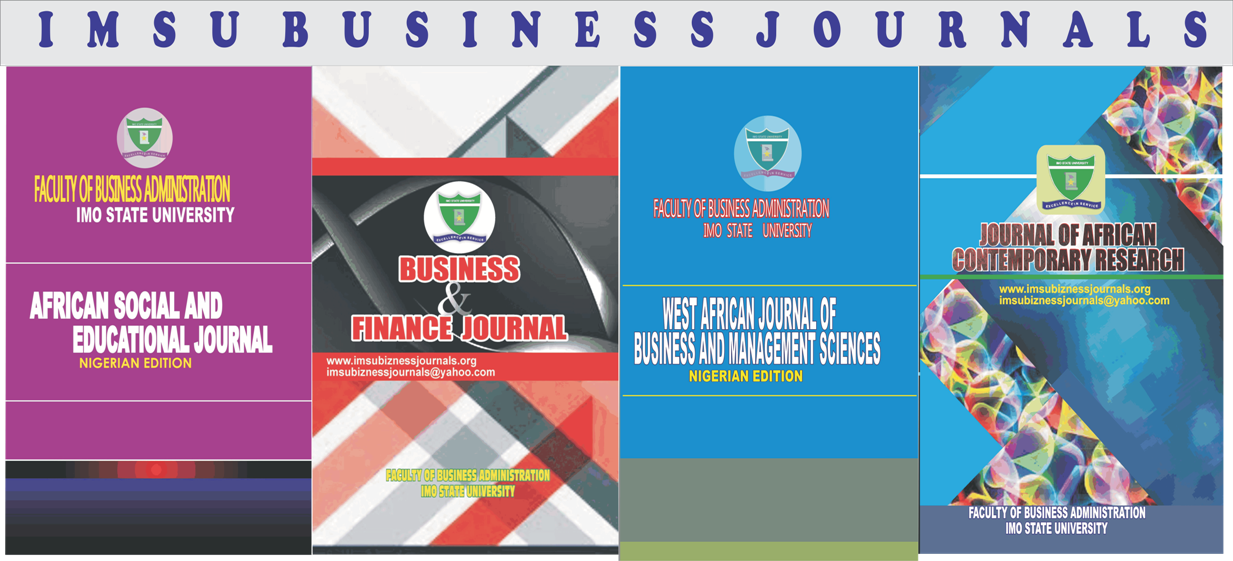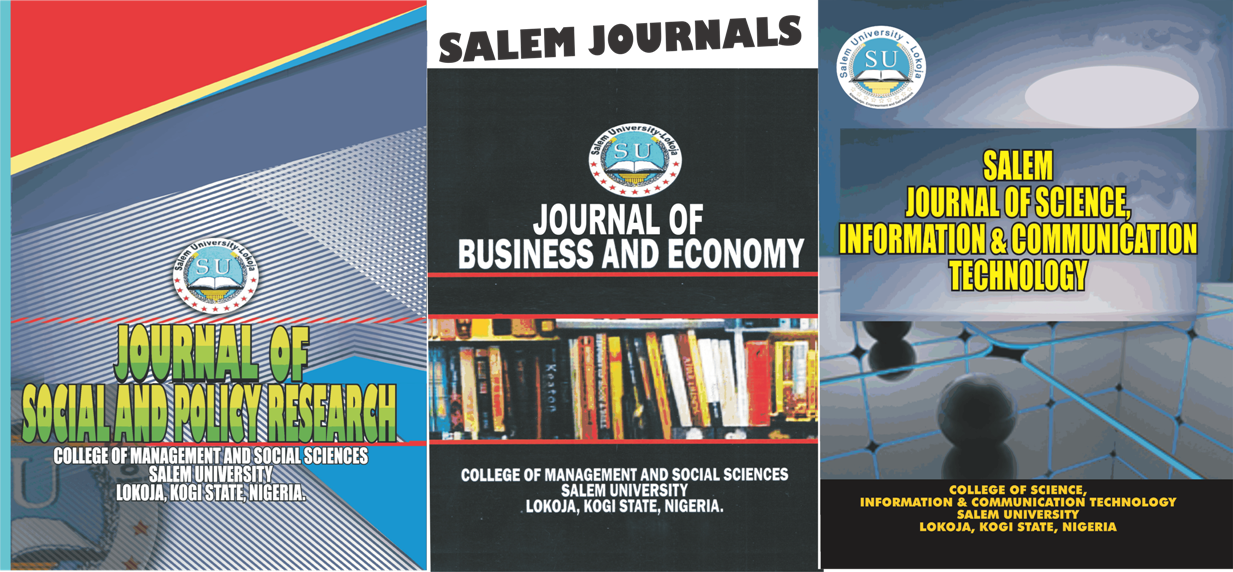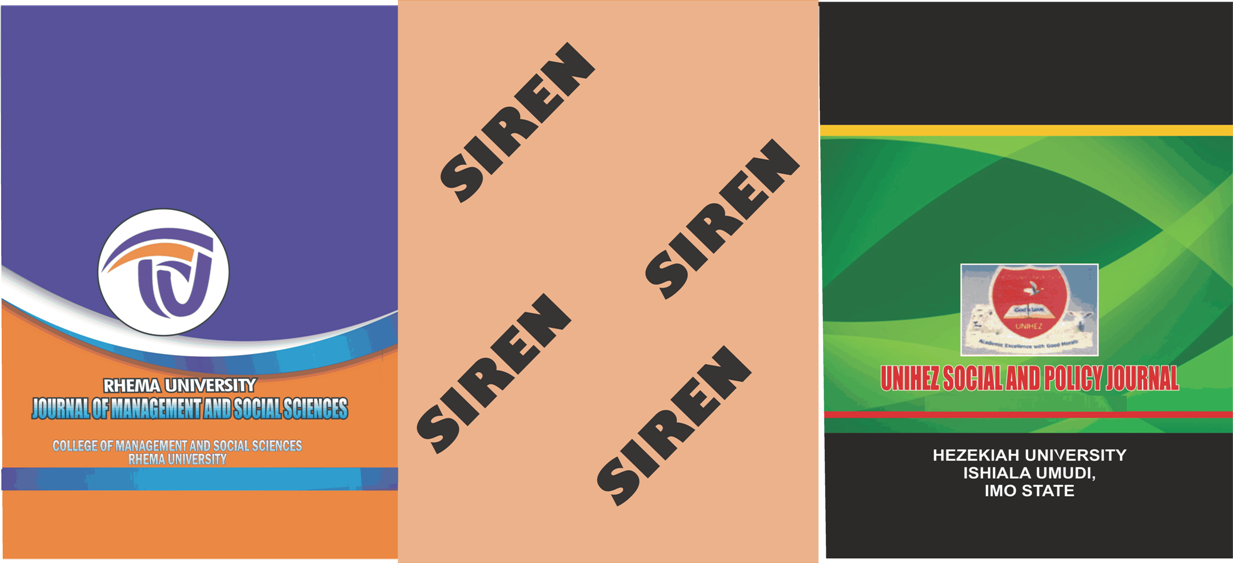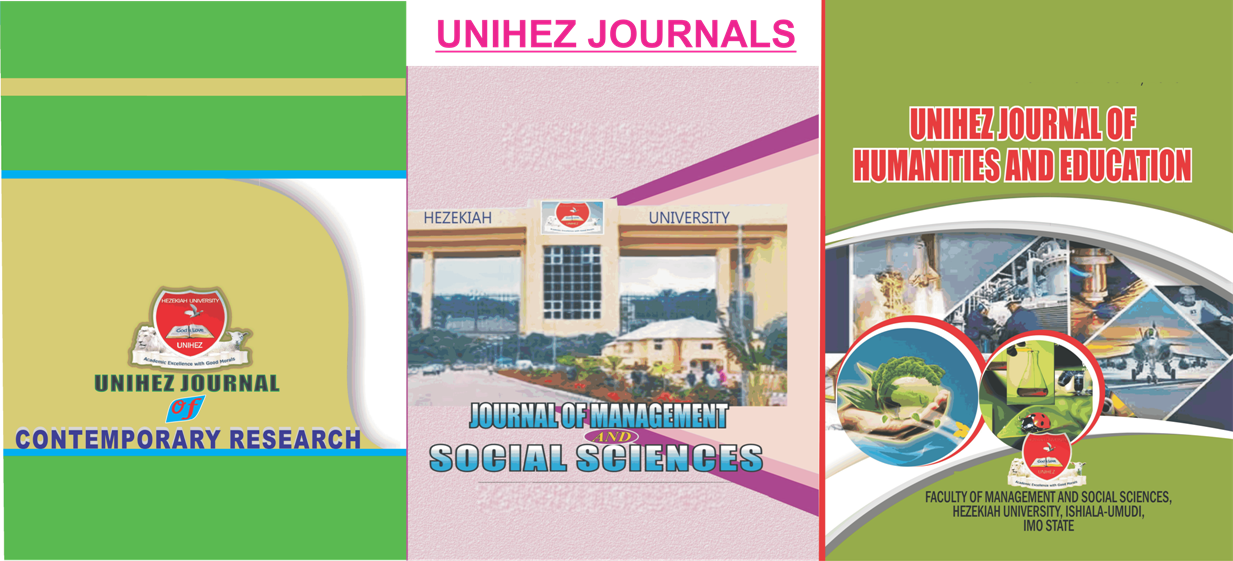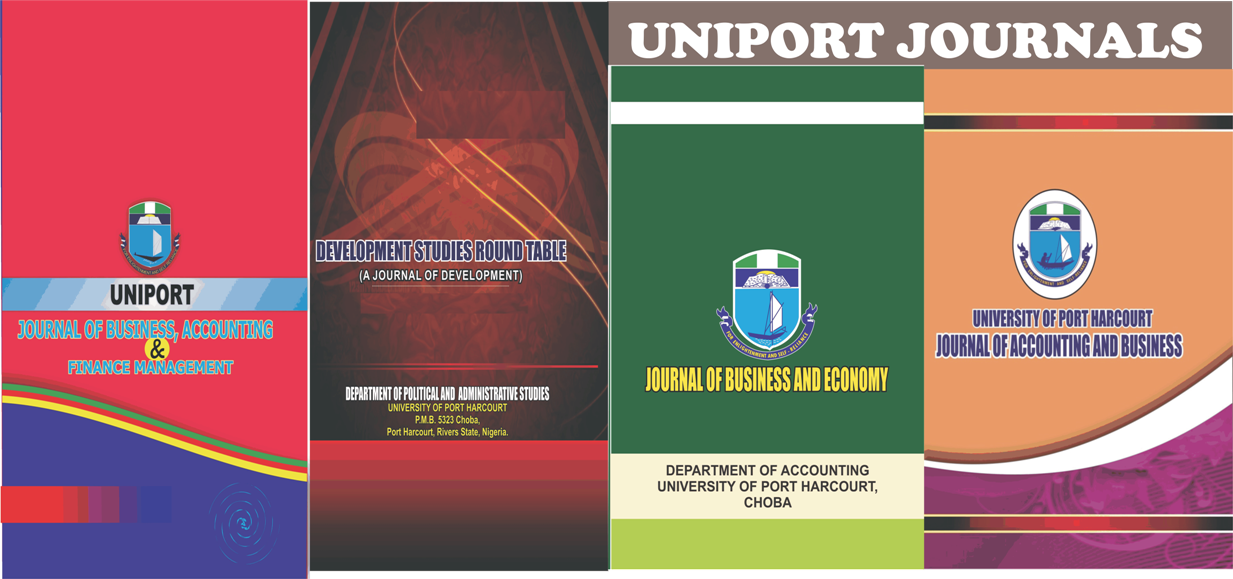2021 Archive
| 1 |
Title: MONETARY POLICY AND ECONOMIC GROWTH IN NIGERIA (1981 TO 2019).pdf Author: OGBONNA UDOCHUKWU GODFREY PhD. Abstract: Abstract The Economic growth of any country is very important for the welfare of its citizenry. In the quest ti facilitate economic growth, it becomes imperative to to identify the economic variables that influence economic growth hence this study to know the relationship between economic growth and monetary policy. The study was carried out using data from CBN statistical bulletin on GDP from 1981 to 2019. A multi regression analysis was carried out to determine the impact of IGR on GDP while a one way anova test using SPSS software was employed to ascertain the respective impact made by monetary policy on economic growth. The result shows that for each year’s increase in GDP, there is 3.889, 323.074, 0.287 increase in Money supply, Interest rate and Credit to private sector respectively, while there is a decrease of 467.638 decrease in Monetary policy Rate. This confirms that there is a relationship between monetary policy and economic growth and that monetary policies (money supply, interest rate, credit to private sector and monetary policy rate) individually and collectively impacts on economic growth in Nigeria. View |
| 2 |
Title: THE IMPACT OF TAX INCENTIVES ON FOREIGN DIRECT INVESTMENT (FDI) AND EXPORT PROMOTION (NIGERIA AND GHANA, 1999-2020).pdf Author: WOSU EMMA OGBONDA (PhD), BARIKUI, TORDEE AND ABUBA SOLOMON Abstract: Abstract The aim of the study was to determine the effect of tax incentives on foreign direct investment (FDI) and exports promotion in Nigeria and Ghana from 1999-2020. The study examined the plethora of challenges faced by developing countries which include lack of investment in capital goods and infrastructure. Studies have shown that FDI had necessitated an immense drive to overcome those challenges. The study adopted ex-post facto research design, as secondary data were used for data analysis. The hypotheses were tested using E – view 9 and P-values integrated at 0.05 level of significance. The findings revealed that tax incentives have significant relationship with FDI inflows in Nigeria and Ghana. Also, those FDI inflows have significant effect on export promotion of Nigeria and Ghana. The study recommended that government of Nigeria and Ghana should sustain tax incentive policies in order to attract FDI in export oriented industries and also, the two countries should implement policies and create functional export processing zones and friendly environment to attract more FDI for economic growth of the countries. Keywords: Tax incentive, Foreign Direct Investment, Export Promotion, Nigeria, Ghana. View |
| 3 |
Title: FORENSIC AUDIT AND FRAUD DETECTION IN NIGERIAN PUBLIC SECTOR.pdf Author: DEBEKEME BOYELAYEFA Abstract: Abstract Fraud is devastative to organizations and economies of the world and had generated several studies by erudite scholars. The evolving concepts of forensic audit are an imperative creation in response to the inadequacies of prior studies on forensic audit and conventional investigations in fraud detection. In line with the above, this study is an empirical examination of the relationship between forensic audit and fraud detection in Nigeria public sector. The Donald Cressey fraud triangle theory is the cardinal theory of the study. Cross-sectional field survey of quasi-experimental design was adopted for this study. Twenty-three (23) federal ministries and parastatals in Rivers State constituted the accessible population of the study. Time series data, secondary nature were generated from archival records of Economic and Financial Crimes Commission (EFCC) among others. Descriptive Statistics, Augmented Dickey-Fuller stationarity unit root test, Pairwise Grander Causality test and Multiple Regression Analysis with the aid of econometrics view version 10 were used to analyze the data and tested the stated hypotheses. The findings from the results revealed that the explanatory variables, litigation support services (LSS) investigative accounting (IA) and forensic audit report (FAR) are positively and significantly related to the predictor variable, fraud detection (FD) with LSS β=0.667882, p-value=0.0002< ∝ = 0.05, (IA) β=0.401326, p-value =0.0011 View |
| 4 |
Title: THE EFFECT OF HUMAN RESOURCE MANAGEMENT PRACTICES ON EMPLOYEE ATTITUDE OF SELECTED DEPOSIT MONEY BANKS IN LAGOS STATE, NIGERIA.pdf Author: ADEFOWOPE ALIYU, ADEFULU ADESHOGA AND AKINLABI BABATUNDE Abstract: Abstract The banking sector has continued to be one of the largest employers of labour across the globe. Despite the numerous banking reforms, regulatory supervisions by various banking regulatory bodies and internal control measures put in place, employee performance is still poor. Nigerian banks’ human resource practices are still plagued by cases of inefficiency, labor turnover, fraud, poor service delivery demotivation and dissatisfied workforce syndrome. This study therefore investigated the effect of human resource management practices on employee attitude of selected deposit money banks in Lagos State, Nigeria. This study adopted survey research design. The population of the study was 11,406 employees of 5 selected deposit money banks in Lagos State, Nigeria. The sample size was 741 respondents determined using Cochran formula and selected through a mixed sampling technique comprising of proportionate and simple random sampling techniques. A structured and validated questionnaire was used for data collection. The reliability test yielded Cronbach’s alpha for the constructs ranged from 0.799 to 0.925. The response rate was 72.9%. Data were analyzed using descriptive and inferential statistics.The findings of this study revealed that human resource management practices dimensions had significant effect on employee attitude of selected deposit money banks in Lagos State, Nigeria (Adj. R2 = 0.179, F (535,4) = 30.310, p < 0.05). The study concluded that human resource management practices affect employee attitude of selected deposit money banks in Lagos State, Nigeria. Thus, the study recommended that effective human resources management practices are needed to be in place in any organisation especially in the banking sector in order to continuously improve employee attitude. Keywords: Communication, Compensation, Employee Attitude, Human Resource Management Practices, Training, Worklife Balance. View |
| 5 |
Title: MILITARY EXPENDITURE AND ECONOMIC GROWTH IN NIGERIA.pdf Author: LAWAL, ESTHER O., MOMOH ALUAYE MORNA & MUSA, DASAUKI C. Abstract: Abstract The study investigated the relationship between military expenditure and economic growth in Nigeria from 1981 – 2019. Secondary data from CBN statistical bulletin and World Bank database for real GDP (gross domestic product), Gross fixed capital formation, military expenditure was applied were analyzed using the Vector Error Correction Model (VECM). Two dummy variables were also used to model the period of military regime and Boko-Haram terrorist activities in Nigeria. Military expenditure has a negative effect on economic growth in Nigeria. The study also revealed that Boko-haram activities in Nigeria have drastically reduced growth in Nigeria. Results also showed that when Nigeria was under military regime affected economic growth negatively. The study, recommends strategic ways of spending funds allocated for military activities and ways to ensure security in Nigeria to enable economic growth. Nigeria should also try to start producing armament so that importing of military wares to save resources for development of other sectors of the economy. The military should stay out of Governance role and focus on protection of Nation boundaries from internal and external confrontation. Keywords: VECM, Economic growth, GDP, Boko-Haram. Military regime View |
| 6 |
Title: PSYCHOLOGICAL CAPITAL AND EMPLOYEE INTENTION TO STAY.pdf Author: WOSU, E. O. (PhD), NYONE, C. B. (PhD), ABBEY-K. B. (PhD) AND AKPASI, S. R. (ESQ) Abstract: Abstract The aim of the study was to examine the relationship between psychological capital and employee intention to remain at workplace. The problem of employee leaving the organization has led to huge costs in recruitment and training and lack of performance. The study reviewed extent literature on psychological capital relating to positive organizational behavior (POB) which includes self –efficacy, hope, optimism, and resilience. The finding revealed that self-efficacy, hope, optimism, and resilience have positive relationships with employee intention to remain at workplace. The study recommended that management should improve psychological capital of the employees as it would enhance the spirit and mind of the employees to remain committed and engaged in their work. Key words: psychological capital, self-efficacy, hope, optimism, resilience, employee intention to stay. View |
| 7 |
Title: IMPACT OF INTERNAL CONTROL ON THE FINANCIAL MANAGEMENT OF DEPOSIT MONEY BANKS IN NIGERIA.pdf Author: DR OLAYINKA IFAYEMI MOSES, OGUNDAJO GRACE. O & RAJI MORIAM ABEBI Abstract: Abstract The present paper seeks to examine the impact of internal control on the financial management of deposit money banks in Nigeria for the period 2010-2019. The analysis was conducted based on panel data from ten deposit money banks in Nigeria over the period 2010-2019 and using ex-post-facto research design and the pooled ordinary least square (OLS) estimation method. The findings indicate that return on asset had a positive significant effect on financial management (α = 6.150218, ρ>0.05) and net profit margin had a positive significant effect on financial management (α = 4.945163, ρ>0.05). The study concluded that internal control has significant effect on financial management of deposit money banks in Nigeria. The study made recommendations that adequate internal control system should be put in place at all level of banks’ operation. Keywords: Credit Payment Period, Financial Management, Internal Control, Loan to Asset Ratio, Net Interest Margin. View |
| 8 |
Title: DETERMINANTS OF FOOD INFLATION IN NIGERIA.pdf Author: LAWAL ESTHER. O. & ONYIMA NNENNA. N. Abstract: Abstract The rising food inflation in Nigeria has become a growing concern. This study is an attempt to identify the factors that determine food inflation in Nigeria. Secondary time series data was gathered from CBN Statistical Bulletin and World Development Indictators spanning 1981-2019. The Vector Auto Regressive (VAR) Model was appled to investigate the relationship between food inflation (CPI) and some of its determinants such as exchange rate, money supply, food import and interest rate in Nigeria. Findings show that food import has a positive relationship food inflation. Exchange rate and money supply also has a positive impact on food inflation. Interest rate has a negative relationship with food inflation. This study recommends that local production should be encouraged to increase exports and reduce imports to avoid dumping and ensure that food inflation is reduced, thus contributing to economic growth and development. Also, government should create polices that help reduce exchange rate in order to reduce food inflation. Keywords: Food inflation (CPI), Money supply, Exchange Rate, Food imports, Interest Rate, VAR Model View |
